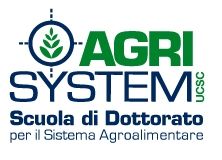DOTTORANDO AREA MICROBIOLOGIA
|
TITOLO DEL PROGETTO
|
 |
Bandini
Francesca |
Studio del destino ambientale di bioplastiche in suoli ed impianti di compostaggio |
| L’obiettivo del progetto è la valutazione dei processi di degradazione delle bioplastiche secondo un approccio di tipo scalare. A partire dalle condizioni reali di un impianto di compostaggio si passerà a prove di laboratorio e livello di microcosmo per studiare in modo dettagliato e standardizzato il destino delle bioplastiche. Inoltre, si tratterà anche la possibile interazione tra le plastiche di origine biologica e le plastiche tradizionali derivanti dal petrolio. Successivamente, le indagini si svolgeranno all’interno di un mesocosmo impiegando impianti pilota e arrivando a validare i risultati a livello industriale (impianti reali). |
| |
 |
Bellassi
Paolo |
OMICS-Profiling formaggi a pasta dura DOP italiani |
| Il progetto si pone l’obbiettivo di caratterizzare e valutare la biodiversità batterica, genica e metabolomica nei formaggi DOP vagliando la loro capacità discriminante, di marker di tipicità e repressione frodi. In seguito correlare più tecniche “omiche” per approfondire il rapporto fra comunità batterica e metaboliti durante tutto il processo di caseificazione e maturazione dei formaggi a pasta dura italiani. |
| |
 |
Belloso Daza
Mireya Viviana |
Evaluation, testing, and optimization of the most innovative DNA-based methodologies for the development of biosensors for food safety and in a wider view, for the agri-food system. |
| Research on innovative methods using interdisciplinary knowledge in molecular diagnostics and food technology are going to be applied to attempt to solve the main issues occurring along the production chain of the agri-food system, proving support for the food quality assurance management and control. For the specific methodologies, the use of WGS data is crucial for the probe design and biosensors validation. |
| |
 |
Bourdichon
François
|
The QPS status for strains of Weissella genus |
|
Food cultures used in food fermentation have a safe empirical history of use of more than 10 000 years, back to the earliest step of pastoralism. They have gained recent interest for their beneficial properties on public health and defined as probiotic when used for the generally healthy population, biotherapeutic agents when used for specific medical purposes. We focus our research on the safety demonstration and aim to propose guidelines for the precaution of use of food cultures belonging to the genera Lactobacillus and Bifidobacterium for medical purposes or addressing specific vulnerable population.
|
| |
 |
Carnevali
Paola |
Use of plants, species and varieties, with natural functional impact to design and produce natural high added value foods for technological, functional, sensorial properties.
|
|
The main objectives are:
- Botanical and genomic research for the selection of plants’ varieties and species, with the aim to identify the natural properties of interest.
- Natural fermentation with selected microbial strains.
- Further selection of best combination microbial consortia based on high affinity in small cereal substrate.
- Fermentation and digestion in vitro to verify functional desidered properties.
- Pilot test production of natural healthy prototypes in line with health‐conscious of modern consumer expectations & with strategy of my Company.
|
| |
 |
Cortimiglia
Claudia |
Innovative systems for identification and enumeration of microorganisms in the agro-food chains |
| The need of inexpensive and real time detection of foodborne pathogens leads to the exploration of new methods. Limitations of standard methods may be overcome by advanced approaches, that join nanotechnology and innovative processing methods. The project aims at the development and application of innovative molecular diagnostic methods for the rapid detection of living microorganisms in food. |
| |
 |
Misci
Chiara |
SASS – Sistemi Alimentari e Sviluppo Sostenibile. Fermentation of neglected and underutilized species (NUS) |
| In an environment, as the Sub-Saharian Africa, characterized by elevated post-harvest losses that cause a condition called hidden hunger, and where dysentery is the major cause of children death, the necessity to investigate in food safety and food security is high. The aim of this project is to use the fermentation as a tool for an increased food security, trying to perform this process in according to the small farmer possibility. Leafy vegetable NUS will be exploited and investigated because of their nutrients content. |
| |
 |
Milani
Giovanni |
Microbiological Food Safety in a Global Scale: new challenges and emerging risks |
|
The main objectives are:
Evaluation and characterization of antimicrobial resistance bacteria in the food chain
Genomics analysis of antimicrobial resistance pathogens isolated from food products
Development of mitigation measures to limit consumer exposure to pathogenic and antimicrobial resistance bacteria through food
|
| |

















